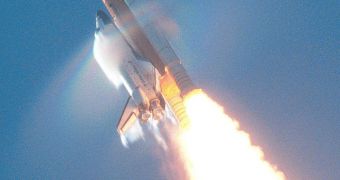Right on schedule, the space shuttle Atlantis has been cleared for take off on the 6th of December, in a mission destined to fly the European space module Columbus to the International Space Station. The spacecraft will be commanded by Stephen Frick and will have a total of seven astronauts on board.
This will be the fourth shuttle mission this year, and it represents the higher number of space flights made by NASA, since the tragedy in 2003, when the space shuttle Columbia disintegrated during re-entry, because of a gapping hole in its left wing. This mission comes after the mission of last month, when the crew of the ISS made three spacewalks in a period of 15 days, in order to complete the connection to the European space module Harmony.
These spacewalks increased in importance, as the European space module Harmony, which was delivered last month by the space shuttle Discovery, has been designed with multiple docking ports; and also, the following two missions will deliver a module that will be docketed to the Harmony. After the Columbus, the next module flown to the ISS will be the Japanese Kibo laboratory, representing the next stage of the space station expansion for the following year.
During the scheduled mission, the crew of the Atlantis shuttle have programed at least three spacewalks, spanning on a period of eleven days in order to connect the new module and to replace some of the hardware and one of the crew member, on board the ISS.
Because of the fact that the damaged rotary joint, supporting one of the solar panel, hasn't been yet repaired, NASA might take into consideration to extend the mission by another two days and make a fourth spacewalk, but it is still undecided as they cannot exactly calculate how long the power supplies on board the Atlantis will last. Though it has been previously inspected by the crew of the ISS, during the spacewalks done in order to connect the power and coolant lines, the results have been inconclusive. They might require an extra inspection in order to gather more data about what failure might have caused the damage and to clearly decide what repair plan should they follow.
However, though the power supplies may hold the crew back, fatigue may also play an important role in taking the decision whether to extend the mission or not, and the inspection could be delayed for another mission. The space shuttle has already been equipped with spare parts, and NASA has already planed another space mission, for February next year. And this could quickly turn into a long series of multiple spacewalks in order to repair the faulty equipment.
The spaceflight controllers and the engineers on Earth have been alerted last week, when during a pressure check in order to ensure the seal between the Destiny and Harmony module, they have discovered a possible leak between the two. Several tests, carried out on the ISS, showed that what appeared to be a parasite signal might be a consequence of instrumentation error; but some tests are still being conducted, just in case they find signs of an actual leak.

 14 DAY TRIAL //
14 DAY TRIAL //